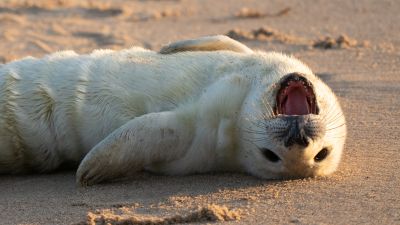RSPCA expecting another big rise in seal injuries putting a strain on charity funding

The number of sick, orphaned and injured seals treated by a wildlife charity has risen by 57% - with numbers set to go even higher this year.
The RSPCA said 246 were admitted to its centres in 2019, increasing to 387 by 2021.
But already this year, teams have taken in 328 seals, the majority of which are pups who are sick, orphaned or injured.
Many end up at the RSPCA's specialist centres in East Winch, Norfolk, and West Hatch, Somerset. The animals typically spend four to six weeks in the care of the teams there before being released back into the wild.
Evangelos Achilleos, manager at RSPCA East Winch, said: "Sadly we are seeing an increasing number of seals with deep laceration injuries caused by plastic litter like frisbees and discarded fishing equipment which is very concerning - so our work is needed more than ever before."
The UK's largest grey seal colony is at Blakeney on the north Norfolk coast where around 4,500 pups are expected to be born this winter.
The first pup was welcomed in October and the colony is now so big that rangers have given up counting them individually.
Roughly half of the world’s population of grey seals live around the British coastline. They can live up to 35 years, and can weigh up to 350kg (55st 2lb).
The influx of injured seals is pushing the RSPCA's resources to the limits. The charity spends around £100 a day on salt baths alone - a key part of the rehabilitation for seals.
Pups need to be fed every three hours and will eat 3kgs of fish each day, costing £30 a week. Medication from vets often cost more than £200 per seal.
The RSPCA has been awarded £350,000 by the People's Postcode Lottery to help support its work.
Want a quick and expert briefing on the biggest news stories? Listen to our latest podcasts to find out What You Need To Know.